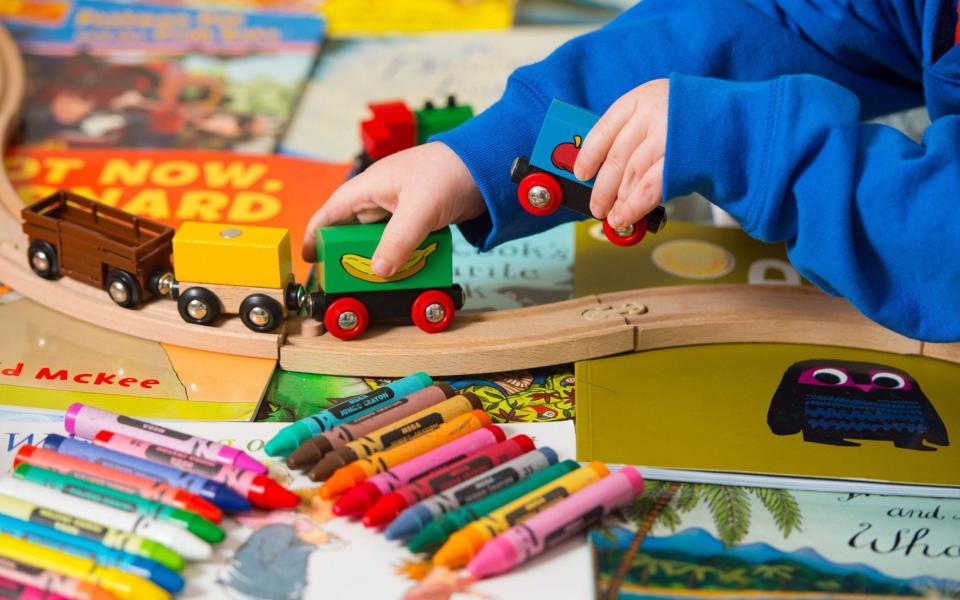Parents told to buy Christmas toys early to beat shortages

Toy importers are warning parents to get their Christmas shopping done early as soaring shipping costs risk price rises and empty shelves.
Freight costs have surged in the past year and are threatening to sustain inflation far beyond the effects of reopening.
The cost of shipping a standard 40ft container from Shanghai to Rotterdam – Europe’s biggest port – has skyrocketed to more than $13,000, according to maritime consultancy Drewry. Twelve months ago it was less than $2,000.
The eye-watering rises are rapidly eroding importers’ margins, forcing them to increase prices. On Wednesday, Barbie-maker Mattel warned it would have to raise prices in the coming months due to higher costs.
Earlier this week, rival Hasbro warned it expected sea freight costs to be an average of four times higher this year than in 2020.
David Gould, a director at DM Gould Wholesale, a major UK importer of toys and seasonal products, said his company was having to pay up to $18,000 per container.
“As time has gone on, these costs are filtering through with new stock that we deliver to the retail trade,” he said.
“Obviously, that's then being passed on to the consumer through higher prices. It's the only way that we can actually economically bring the gear in.”
Gaynor Humphrey, commercial director at Best Years, which supplies toys to a number of retailers including many independent shops and museums, said the cost of containers had tripled since Easter.
“I've never ever experienced anything like this,” she said – adding that shipping companies were coming up with “farcical” reasons for introducing higher costs.

Some companies were delaying orders in the hope that rates will subside, raising the possibility of shortages in the coming months.
Mr Gould recommended consumers shopped early to beat the end of year rush: “There are going to be further sub shortages and inevitable price increases.”
Mr Humphrey said parents should not hesitate if they wanted a certain toy for their children in the coming weeks.
“If you find it, buy it, because either you won't get it near Christmas, or the price could have gone up," he said.
Covid-19 restrictions are slowing loading and unloading, which has led to blockages at several ports in the US and Asia.
Part of the problem is that a misaligned emergence from lockdowns means many Western manufacturers are not at full capacity, meaning not as many containers are making the journey back to Asia and leading to shortages in the region’s ports. The week-long closure of the Suez Canal in March has added to the problems.
Global trade began to level off in May, and economists are now warning container costs are weighing on demand – spelling trouble for the global recovery.
Real goods trade edged down during the month, following a rapid rebound from the devastation caused at the onset of the pandemic.
The latest data from CPB Netherlands Bureau showed a 0.3pc fall, while an initial estimate that goods trade rose 0.5pc in April was revised down to no change.
Simon MacAdam at Capital Economics said there are early indications that a period of “normalisation” has not begun.
“The most recent national trade data revealed only a partial recovery in June, suggesting that global trade has continued to move sideways,” he said.
“What’s more, export orders have continued to come off the boil, potentially reflecting sky-high shipping container costs eating into demand.”
Soaring rates are beginning to impact some of the UK’s top companies. Consumer goods giant Unilever warned last week that it was experiencing a 40pc to 50pc rise in shipping costs that would push up consumer prices. Meanwhile premium mixer maker Fever-Tree said increased logistics costs were eating into its margins.
Shipping companies are reaping the benefits of the unusual mismatch between supply and demand, with Danish giant Maersk reporting a first-quarter profit of $2.7bn, of which it attributed “around $2bn” to “extraordinary market conditions”. Its profits are estimated to soar even further to $3.5bn in the second quarter.
In the UK, problems are being made worse by a severe shortage of HGV drivers, which senior managers have warned could lead to shortages around peak times. The CBI lobby group has called for lorry drivers to be added to Britain’s skills shortages list.
Ben Broadbent, the Bank of England deputy governor, highlighted shipping problems in a speech last week, but said prices should post “material declines” over the coming year.
